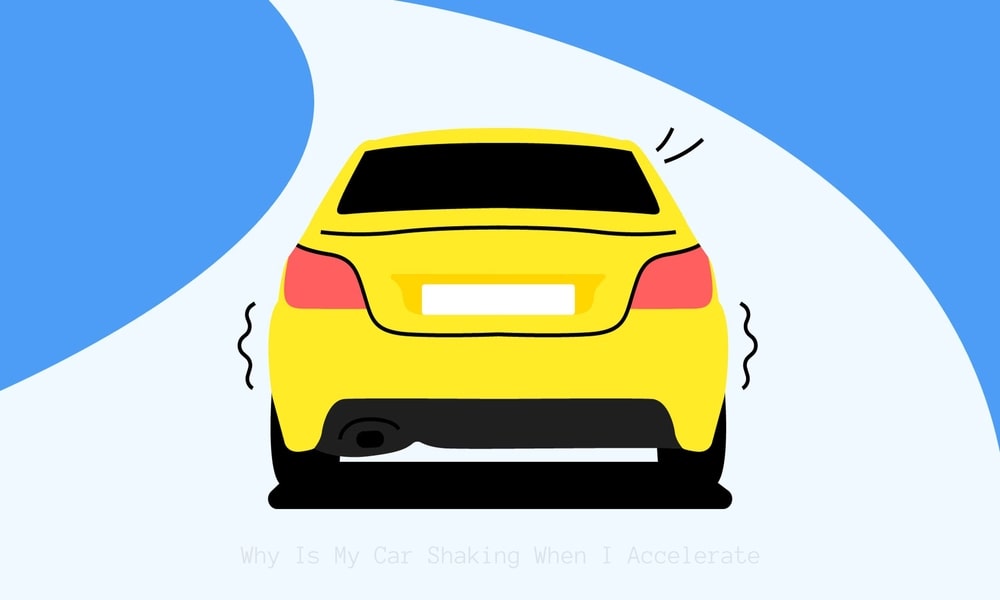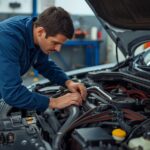Many drivers surprise, “Why is my car shaking when I accelerate?” It can because you concern. The shaking can lessen comfort while driving, but also could be a warning of underlying problems. Saving time and money by identifying the root causes, as well as knowing what to do about them, can help you avoid unnecessary anxiety and save on your driving comfort.
Common causes of car shaking
1. Car component issues
Car component issues are among the most common answers to the question, “Why is my car shaking when I accelerate?” These issues can happen from a variety of parts of the vehicle that add to its operation and strength. Here’s a breakdown of the most common car component issues that cause vibrations:
Wheel and tire problems
A smooth ride is dependent on the tires. A number of issues may cause your car to shake, especially during acceleration.
- Uneven Treadwear: Tires can wear down over time. However, uneven tread wear may cause vibrations. The most common cause of vibrations is when tires don’t get rotated enough or if alignment problems exist.
- Misalignment: Your tires may not touch the road evenly when they are misaligned. This affects the vehicle’s handling and can cause vibrations.
- Defective Tires: Tires which have noticeable damage (such as punctures, bulges, cracks) can result in an wobbly drive. It is likely to feel a noticeable shake when there’s a slight imbalance with the reliability of your tires.
2. Suspension and steering issues
Suspension and steering are essential to keeping your vehicle in a stable, easy-to-handle condition. This can result in vibrations.
- Worn Out Suspension Systems: The suspension provides a smoother ride by absorbing the shocks. Shaking is a sign that worn-out parts like shocks or control arms have failed.
- Loose, damaged, or worn-out steering components: Steering component wear can occur over time. In this case, steering precision is reduced and vibrations can occur during acceleration and turning.
3. Engine and transmission issues
It is the combined effort of engine and gearbox that transfers power from one wheel to another. It is possible for their performance to be disrupted and cause the vehicle to shake.
- Engine Fires: A fire occurs when the fuel in a cylinder or cylinders fails to ignite. This imbalance can cause noticeable vibrations especially when driving fast.
- Old Motor Mounts. The motor mounts fix the engine into the car’s chassis. The engine shakes excessively if the motor mounts are worn.
- The Transmission Problem is when the transmission fails to work smoothly. This can result in jerking vibrations, or even a jerk or shake while shifting gears.
4. Brake Issues
Although brakes are primarily used for stopping, they can also cause vibrations.
- Rotor Warp: Rotors warp when exposed to extreme heat or wear. It is the uneven surface that causes vibrations.
- Callipers Not Moving: Callipers do not move when the car is slowed down. It can be very uncomfortable to accelerate if the brakes stick.
Diagnosing and repairing the Issue
If you’re yet asking, “Why is my car shaking when I accelerate?” it’s time to examine exact areas of your vehicle.
Step 1: Inspect the wheels and tires
Inspect the tires and look for apparent damage, consisting of bulges or cracks. The tires ought to be nicely inflated, and they should also be balanced. In the event that your trouble does now not solve, you have to consult an expert to take a look at wheel alignment.
Step 2 – Inspect the suspension system
A mechanic examines the suspension additives for worn elements like shocks, bushings, and struts. By replacing these components, you can repair the smoothness of your vehicle’s trip.
Step 3: Engine diagnostic check
Diagnostic systems are built into modern cars. By using an OBD-II reader, you are able to read the error codes in order to determine engine-related issues like misfires. To fix them, replace faulty fuel injectors, coils or spark plugs.
Step 4 – Brake system Inspection
The brake rotors should also be checked, as well as the pads and calipers. It is important to replace or fix warped rotors, or sticky calipers in order to prevent vibrations.
Safety precautions
The car shaking when I accelerate can not only be inconvenient but it is also dangerous. These safety steps will reduce risks in the meantime.
1. Avoid driving at high speed
The car can also become instable if it shakes at speed. In order to maintain better control you should drive at slower speeds.
2. Do not delay repairs
It may be easy to ignore vibrations at first. But if you ignore them, it will only make it inferior. Accidents can occur if worn-out parts, such as tires and suspension parts, fail.
3. Do not drive if you feel a severe shake
Pull over in a safe place and ask for professional help. When you’re driving under these conditions, both yourself and other road users are put at risk.
4. Never overload your vehicle
Excessive loads can affect suspension, tires and other vehicle components. They may also cause the vehicle to shake. You should keep the weight of your car within the limits recommended by manufacturers.
5. Schedule regular Inspections
It is exceptional to perform preventative preservation so that it will keep away from vehicle shaking. By having a mechanic look at the automobile on a ordinary foundation, you could become aware of issues in advance earlier than they are intense.
Preventive measures and regular maintenance
1. Regular tire maintenance
Tires need to be rotated at intervals of 5,000-7,500 miles in order to maintain even wear. A routine inspection can prevent vibrations as well by balancing wheels and aligning them.
2. Schedule engine tune-ups
Regular tune-ups include checking and changing spark plugs. You can ensure that your engine operates smoothly by replacing the spark plugs, ignition coils and filters.
3. Schedule regular brake inspections
A brake check annually can detect problems early, like warped rotors. Avoid costly repairs with preventive maintenance.
4. Keep your suspension in good condition
It is important to perform regular suspension inspections so that you can detect worn-out components early and replace them. This improves vehicle stability by reducing vibrations.





